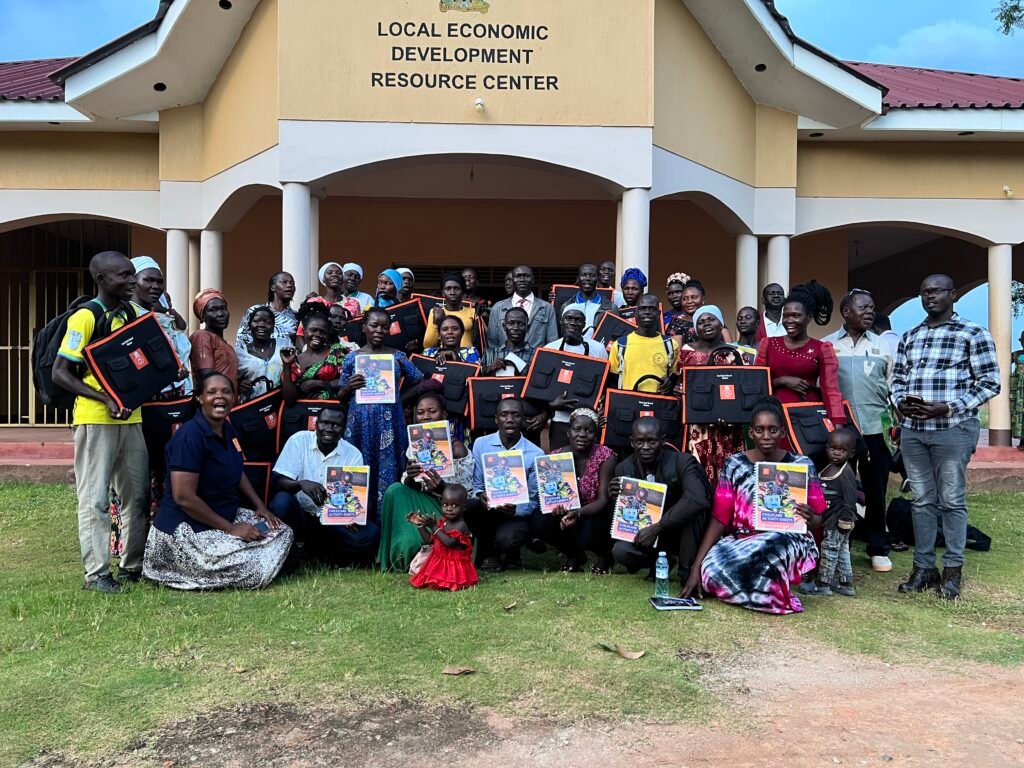Obongi District, Uganda — As part of the UNICEF-funded Strengthening Early Childhood and Childcare Services Delivery project, LABE conducted a capacity-building training for Parent Educators (PEs) and Child Caregivers (CCGs) from Yumbe and Adjumani Districts.
The training aimed to equip participants with the knowledge and skills to effectively support children’s early learning and holistic development through Home Learning Centres (HLCs), a community-based model that brings early learning and childcare closer to families.
Empowering those who nurture and teach
Through participatory and hands-on sessions, the trainees explored topics such as child growth and development, play-based learning, early communication and socialization, child protection, and creating stimulating home environments. Practical demonstrations also helped participants learn how to organize learning sessions, plan daily routines, and engage parents in HLC activities.
Facilitators emphasized that HLCs are more than spaces for early learning — they are safe, familiar, and inclusive environments where children aged 0–6 years learn through play, storytelling, and exploration, guided by trained caregivers and supported by their parents.
“When parents and caregivers understand how children grow and learn, they can transform ordinary homes into nurturing spaces that prepare children for school and for life,” said one facilitator during the session.
By the end of the training, participants expressed readiness to apply their new skills in setting up and running HLCs in their communities. The initiative is part of LABE’s broader effort to promote family-led, community-based early childhood development, ensuring every child — regardless of background — has the opportunity to learn, grow, and thrive from the earliest years.
Bringing learning closer to home
Under the project, LABE supports the establishment of HLCs — safe, familiar spaces within communities where children learn through play, and parents receive guidance on early stimulation and responsive care.
The model encourages family participation, shared responsibility, and collaboration among caregivers, community leaders, and local governments — ensuring that every child benefits from nurturing care and early learning opportunities.
Closing the early learning gap
Uganda continues to face major challenges in providing equitable access to quality and inclusive Early Childhood Development (ECD) services, particularly for refugee populations, rural families, and adolescent mothers. According to the 2023 Early Childhood Care and Education (ECCE) Policy, nearly half (47.3%) of children aged 3–5 years are not accessing any form of pre-primary education. The gap is even wider in refugee-hosting districts, where over 116,000 children remain outside of formal ECD provision.

Many families cannot afford private nursery fees, while public investment in pre-primary education remains limited. Children under three years are often excluded altogether, despite this being a critical window for brain development. Meanwhile, adolescent mothers — who make up nearly a quarter of all young women aged 15–19, often lack access to parenting support or child-friendly services.
Through the project, LABE is helping to bridge these gaps by championing home-based, non-formal ECD models that are low-cost, inclusive, and community-driven. HLCs bring early learning closer to families — transforming ordinary homes into vibrant centres of play, communication, and discovery. The model also links early learning with health, nutrition, and economic empowerment through Village Savings and Loan Associations (VSLAs), helping families achieve both nurturing care and self-reliance.
With support from UNICEF Uganda and in partnership with district governments, LABE has reached over 2,300 children and nearly 1,800 parents in refugee-hosting regions across Northern Uganda. The expansion of HLCs to Adjumani and Yumbe represents another key step toward ensuring that no child is left behind, and that every family — regardless of circumstance — can take part in shaping a brighter, more equitable future for Uganda’s youngest learners.
Happening now: Parent Educators & Child Caregivers from Yumbe & Adjumani are being trained on session delivery under the @UNICEFUganda-funded 𝐒𝐭𝐫𝐞𝐧𝐠𝐭𝐡𝐞𝐧𝐢𝐧𝐠 𝐄𝐚𝐫𝐥𝐲 𝐂𝐡𝐢𝐥𝐝𝐡𝐨𝐨𝐝 & 𝐂𝐡𝐢𝐥𝐝𝐜𝐚𝐫𝐞 𝐒𝐞𝐫𝐯𝐢𝐜𝐞𝐬 𝐃𝐞𝐥𝐢𝐯𝐞𝐫𝐲 project.#ECD #Childcare pic.twitter.com/Hzzk1hWL9r
— LABE Ug (@LABE_Ug) November 5, 2025